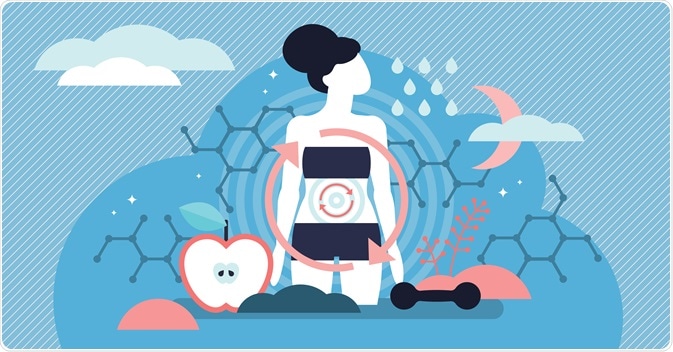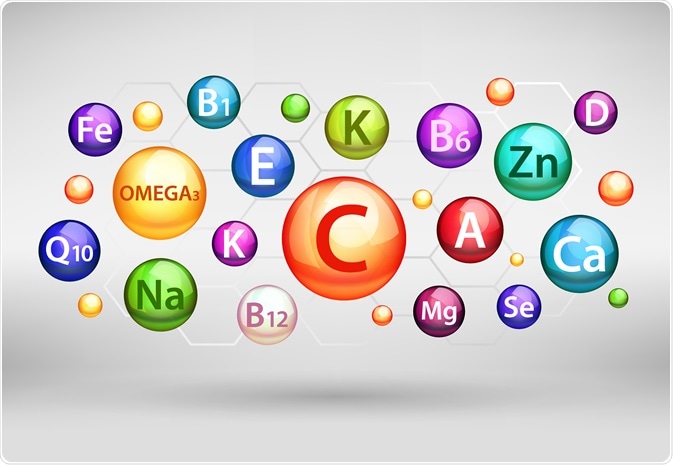Metabolism is a term that is used to describe all chemical reactions involved in maintaining the living state of the cells and the organism. Metabolism can be conveniently divided into two categories:
- Catabolism - the breakdown of molecules to obtain energy
- Anabolism - the synthesis of all compounds needed by the cells
Metabolism is closely linked to nutrition and the availability of nutrients. Bioenergetics is a term that describes the biochemical or metabolic pathways by which the cell ultimately obtains energy. Energy formation is one of the vital components of metabolism.
 Image Credit: VectorMine / Shutterstock.com
Image Credit: VectorMine / Shutterstock.com
Nutrition, metabolism and energy
Nutrition is the key to metabolism. The pathways of metabolism rely upon nutrients that they breakdown in order to produce energy. This energy in turn is required by the body to synthesize molecules like new proteins and nucleic acids (DNA, RNA).
Nutrients in relation to metabolism encompass factors like bodily requirements for various substances, individual functions in the body, the amount needed, and the level below which poor health results.
Essential nutrients supply energy (calories) and supply the necessary chemicals which the body itself cannot synthesize. Food provides a variety of substances that are essential for the building, upkeep, and repair of body tissues, and for the efficient functioning of the body.
The diet needs essential nutrients like carbon, hydrogen, oxygen, nitrogen, phosphorus, sulfur, and around 20 other inorganic elements. The major elements are supplied in carbohydrates, lipids, and protein. In addition, vitamins, minerals and water are necessary.
Carbohydrates in metabolism
Foods supply carbohydrates in three forms: starch, sugar, and cellulose (fiber). Starches and sugars form major and essential sources of energy for humans. Fibers contribute to bulk in diet.
Body tissues depend on glucose for all activities. Carbohydrates and sugars yield glucose by digestion or metabolism.
The overall reaction for the combustion of glucose is written as:
C6H12O6 + 6 O2 -----> 6 CO2 + 6 H2O + energy
Most people consume around half of their diet as carbohydrates. This comes from foods such as rice, wheat, bread, potatoes and pasta.
Proteins in metabolism
Proteins are the main tissue builders in the body. They are part of every cell in the body. Proteins help in cell structure, functions, hemoglobin formation to carry oxygen, enzymes to carry out vital reactions and a myriad of other functions in the body. Proteins are also vital in supplying nitrogen for DNA and RNA genetic material and energy production.
Proteins are necessary for nutrition because they contain amino acids. Among the 20 or more amino acids, the human body is unable to synthesize 8 and these are called essential amino acids.
The essential amino acids include:
- Lysine
- Tryptophan
- Methionine
- Leucine
- Isoleucine
- Phenylalanine
- Valine
- Threonine
Foods with the best quality protein are eggs, milk, soybeans, meats, vegetables, and grains.
Fat in metabolism
Fats are concentrated sources of energy. They produce twice as much energy as either carbohydrates or protein on a weight basis.
The functions of fats include:
- Helping to form the cellular structure;
- Forming a protective cushion and insulation around vital organs;
- Helping absorb fat-soluble vitamins,
- Providing a reserve storage for energy
Essential fatty acids include unsaturated fatty acids like linoleic, linolenic, and arachidonic acids. These need to be taken in diet. Saturated fats, along with cholesterol, have been implicated in arteriosclerosis and heart disease.
Minerals and vitamins in metabolism
The minerals in foods do not contribute directly to energy needs but are important as body regulators and play a role in metabolic pathways of the body. More than 50 elements are found in the human body. About 25 elements have been found to be essential, meaning a deficiency produces specific deficiency symptoms.
Important minerals include:
- Calcium
- Phosphorus
- Iron
- Sodium
- Potassium
- Chloride ions
- Copper
- Cobalt
- Manganese
- Zinc
- Magnesium
- Fluorine
- Iodine
Vitamins are essential organic compounds that the human body cannot synthesize by itself and must, therefore, be present in the diet. Vitamins particularly important in metabolism include:
- Vitamin A
- B2 (riboflavin)
- Niacin or nicotinic acid
- Pantothenic Acid
 Image Credit: Siberian Art / Shutterstock.com
Image Credit: Siberian Art / Shutterstock.com
Metabolic pathways
The chemical reactions of metabolism are organized into metabolic pathways. These allow the basic chemicals from nutrition to be transformed through a series of steps into another chemical, by a sequence of enzymes.
Enzymes are crucial to metabolism because they allow organisms to drive desirable reactions that require energy. These reactions also are coupled with those that release energy. As enzymes act as catalysts they allow these reactions to proceed quickly and efficiently. Enzymes also allow the regulation of metabolic pathways in response to changes in the cell's environment or signals from other cells.
References
Further Reading
Last Updated: Jun 14, 2023